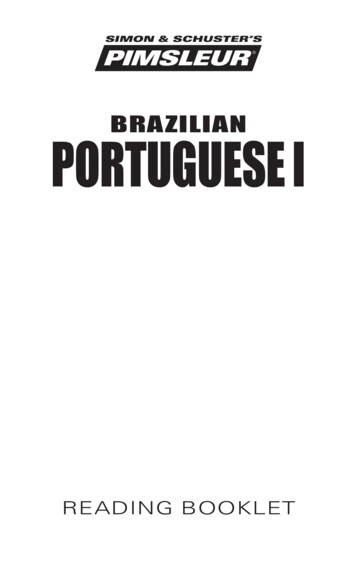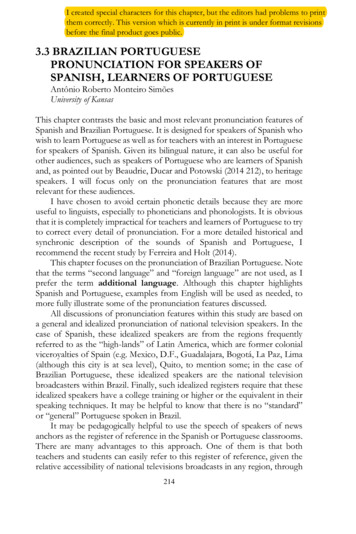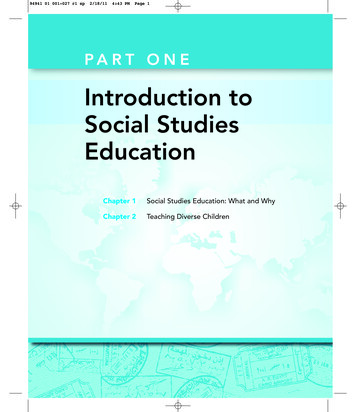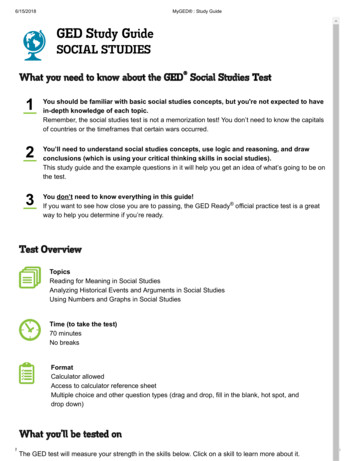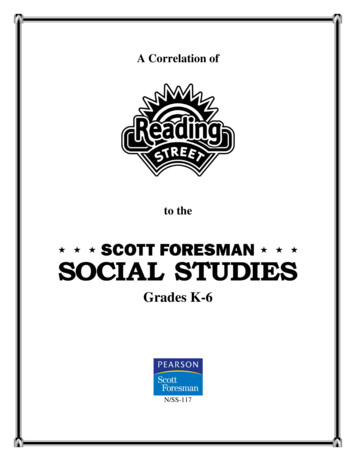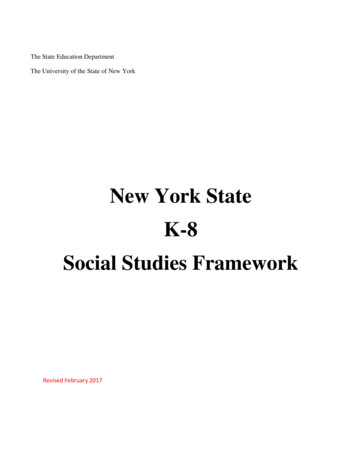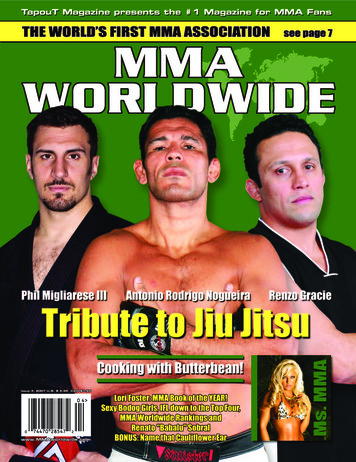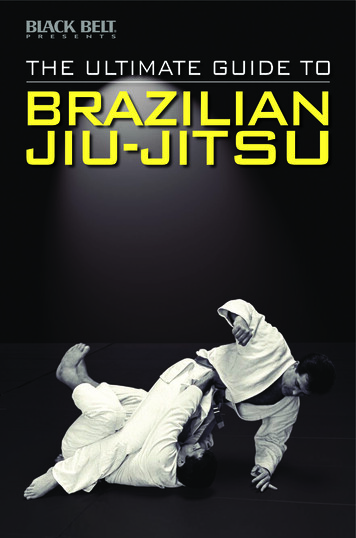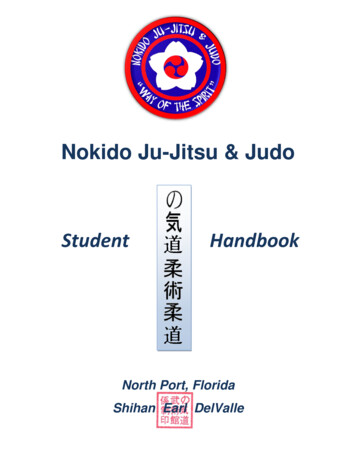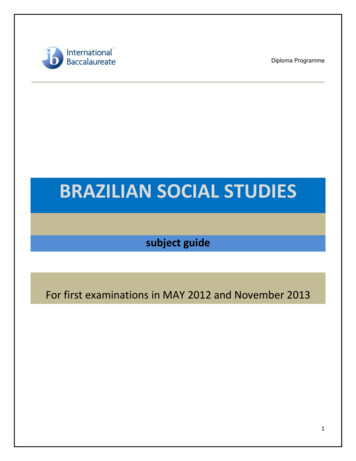
Transcription
Diploma ProgrammeBRAZILIAN SOCIAL STUDIESsubject guideFor first examinations in MAY 2012 and November 20131
AbstractThe original school-based course entitled “Brazilian Social Studies” was prepared jointly by themembers of the Brazilian Social Studies department at the British School of Rio de Janeiro and theAmerican School of São Paulo (Graded). The program originated at the British School in 1994 and wasadopted by Graded in 1998. Since that time numerous modifications have been made to the syllabus inan effort to streamline the curriculum. The intent was and is to create a program accessible to similarschools that might be interested throughout Brazil.Currently, the existing subjects available in IB Diploma group 3, (Individuals and Society), do not deliverknowledge content for the Brazilian University Entrance Examination. The fact that the Brazilianuniversities do not yet recognize the IB Diploma has led to a need for a more relevant course in theHumanities.The Brazilian Social Studies course is designed to balance the content and examination requirements ofthe Brazilian universities and the spirit and style of the IB in a coherent approach that avoids overlapwith existing IB subjects.This is a two-year course taught as a Standard Level option in Group 3 and fulfils the criteria for coursesin Group 3 “Individuals and Society”. International Baccalaureate Organization 20112
ContentsABSTRACT .02 03INTRODUCTIONPurpose of this document .The Diploma programme .Nature of the subject .Aims . .Assessment objectives .Assessment objectives in practice .040507101112SYLLABUSSyllabus outline . .Syllabus details . .Topics in Geography .Topics in History .13141416ASSESSMENTAssessment in the Diploma programme .Methods of assessment and procedures .Assessment outline . .EXTERNAL ASSESSMENT . .External assessment criteria – Paper 1 .External assessment criteria – Paper 2 .Markbands for Paper 2 .18202122222424INTERNAL ASSESSMENTPurpose of internal assessment .Guidance and authenticity .Time allocation .Using the assessment criteria for the internal assessment Internal assessment details .Requirements of the historical and geographical investigation .Internal assessment criteria . 27272828303035GLOSSARY OF COMMAND TERMS .38BIBLIOGRAPHY FOR GEOGRAPHY AND HISTORY OF BRAZILTextbooks References in History .References in Geography . Internet Sites .Movies or videos .Institutions Holding Source Material 393943454547CONTENTS3
IntroductionPurpose of this documentThis publication is intended to guide the planning, teaching and assessment of the subject in schools. Subjectteachers are the primary audience, although it is expected that teachers will use the guide to inform students andparents about the subject.An online group has been set up for Brazilian Social Studies as part of the IB’s Virtual Community network. Allteachers of the subject are welcome to join the group and to use it for posting additional resources to share withother teachers, for example: websites, books, videos, journals or teaching ideas. This initiative is experimental,and its usefulness will be reviewed periodically.First examinations May 2012 and November 20134
IntroductionThe Diploma programmeThe Diploma Programme is a rigorous pre-university course of study designed for students in the 16 to 19 agerange. It is a broad-based two-year course that aims to encourage students to be knowledgeable and inquiring,but also caring and compassionate. There is a strong emphasis on encouraging students to develop interculturalunderstanding, open-mindedness, and the attitudes necessary for them to respect and evaluate a range of pointsof view.The Diploma programme hexagonThe course is presented as six academic areas enclosing a central core. It encourages the concurrent study of abroad range of academic areas. Students study: two modern languages (or a modern language and a classicallanguage); a humanities or social science subject; an experimental science; mathematics; one of the creative arts.It is this comprehensive range of subjects that makes the Diploma Programme a demanding course of studydesigned to prepare students effectively for university entrance. In each of the academic areas students haveflexibility in making their choices, which means they can choose subjects that particularly interest them and thatthey may wish to study further at university.5
Choosing the right combinationStudents are required to choose one subject from each of the six academic areas, although they can choose asecond subject from groups 1 to 5 instead of a group 6 subject. Normally, three subjects (and not more than four)are taken at higher level (HL), and the others are taken at standard level (SL). The IB recommends 240 teachinghours for HL subjects and 150 hours for SL. Subjects at HL are studied in greater depth and breadth than at SL.At both levels, many skills are developed, especially those of critical thinking and analysis. At the end of thecourse, students’ abilities are measured by means of external assessment. Many subjects contain some elementof coursework assessed by teachers. Most IB Diploma subjects are available for examinations in English, Frenchand Spanish. Brazilian Social Studies, however, is an exception, as it is taught and examined in Portuguese; it isalso available as an option in English.The core of the hexagonAll Diploma Programme students participate in the three course requirements that make up the core of thehexagon. Reflection on all these activities is a principle that lies at the heart of the thinking behind the DiplomaProgramme.The theory of knowledge course encourages students to think about the nature of knowledge, to reflect on theprocess of learning in all the subjects they study as part of their Diploma Programme course, and to makeconnections across the academic areas. The extended essay, a substantial piece of writing of up to 4,000 words,enables students to investigate a topic of special interest that they have chosen themselves. It also encouragesthem to develop the skills of independent research that will be expected at university. Creativity, action, serviceinvolves students in experiential learning through a range of artistic, sporting, physical and service activities.The IB mission statement and the IB learner profileThe Diploma Programme aims to develop in students the knowledge, skills and attitudes they will need to fulfil theaims of the IB, as expressed in the organization’s mission statement and the learner profile. Teaching andlearning in the Diploma Programme represent the reality in daily practice of the organization’s educationalphilosophy.6
IntroductionNature of the subjectThe Brazilian Social Studies course is divided into eight topics covering a variety of areas of study in thegeography and history of Brazil. In order to provide a comprehensive view of Brazil’s development and its currentstatus as a regional power in a global economy, the course is connected with individuals, society and environmentin the widest context: physical, political, social, economic, religious, technological and cultural.In both history and geography, students are encouraged to seek answers to broad and complex questionsthrough investigative methods. In history, for example, students are encouraged to reflect on the role of thehistorian and to appreciate different interpretations of past events. In geography, they are encouraged torecognize the ways in which the Brazilian physical space has been organized as the result of socio-economicprocesses, as well as to understand the interaction between human beings and the physical environment.Students are also led to reflect on geographical issues that may require the use of many approaches from variousfields.In addition, students are led through a course of study that allows them to develop an appreciation of Brazilianculture. Assessment of this is woven throughout the assessment of the historical and geographical elements ofthe course.Brazilian Social Studies is a challenging course for both students and teachers. It is taught in Portuguese, and,since the May 2009 session has also been assessed through the medium of Portuguese. Permission to changethe examination language from English to Portuguese has helped immensely, by allowing the students to writethe exam in the language in which the course and materials were given.Prior learningStudents need not have studied history or geography prior to starting this course. In particular, it is neitherexpected nor required that specific subjects have been studied for national or international qualifications inpreparation for this course. The specific skills and knowledge required are developed throughout the course itself.Brazilian Studies and Theory of KnowledgeAs with other areas of knowledge, there is a variety of ways of gaining knowledge in group 3 subjects. Archivalevidence, data collection, experimentation and observation, inductive and deductive reasoning, for example, canall be used to help explain patterns of behaviour and lead to knowledge claims.7
Students in group 3 subjects are required to evaluate these knowledge claims by exploring knowledge issuessuch as validity, reliability, credibility, certainty, and individual, as well as cultural, perspectives.The relationship between each group 3 subject and Theory of Knowledge is of crucial importance andfundamental to the Diploma Programme. Having followed a course of study in group 3, students should be able toreflect critically on the various ways of knowing and on the methods used in human sciences, and in so doingbecome ―inquiring, knowledgeable and caring young people‖ (IB mission statement). During the course a numberof issues will arise that highlight the relationship between theory of knowledge and Brazilian Social Studies.Teachers should be aware of the following questions and aim to use at least one from each set of issues implicitlyand explicitly in their teaching of the subject syllabus.Cultural Knowledge Issues To what extent is our identity, and our knowledge of ourselves affected by national culture? If people speak more than one language, is what they know different in each language? Does eachlanguage provide a different framework for reality? Can Portuguese provide a unique way of viewing the world that is different to other languages? If so,what is lost in translation from one language to another? Can we understand our own culture without experiencing, either directly or indirectly, another culture? To what degree are ways of knowing such as reason, perception and emotion biological or ―hard-wired‖,and hence universal to all human beings? To what extent are they shaped by culture and hence differentin different societies? Can human behaviour be usefully classified and categorized? Do national grouping provide a usefultaxonomy, or should they be combined with gender, age, class, sexuality or other classifications? What is the influence of culture on other areas of knowledge, such as the natural and human sciences,history, and the arts?Historical Knowledge Issues Is knowledge of the past ever certain? Do different issues arise when we study the distant and the near past? What are the differences between studying the past of one’s own country and the past of anothercountry? Can history help in understanding the present or predicting the future? Why do accounts of the same historical event differ? Whose history do we study? What determines how historians select evidence and describe/interpret or analyse events? In what ways and to what extent are values embedded in the official and unofficial histories of Brazil, andin Brazilian Studies?8
Human Sciences Knowledge Issues Brazilian Studies is required by the Brazilian government for students sitting the Brazilian UniversityEntrance Examinations. Does this tell you anything about the nature of the course and about knowledgein general? Human individuals are unique, but some aspects of human behaviour can be studied by scientific means.Does the meaning of ―a scientific law‖ means the same in natural and human sciences? Brazilian studies are by definition concerned with Brazil. Is Brazil better defined by the lines on a map,the culture of a people or some other means? To what extent do maps reflect reality? What scientific or social factors might influence the study of a complex phenomenon such as globalwarming? Often in considering social issues such as, for example, development, a model of reality is created. Whatdoes this mean? What are the advantages and disadvantages of creating a model? Arguably, while some features of a country can be measured and quantified, others cannot. Is this thecase? What is it about a quality that means it can or cannot be quantified?Ethical Knowledge Issues Many people value diversity in human affairs. Is globalization therefore a bad thing? How can we know what form of Government is best? How important are values (―principles‖, ―ideals‖) in Brazilian Studies? Is the course primarily concernedwith what is or what ought to be? Where are the following ideas implicit in this course: justice, human rights, social responsibility, equalityand freedom? Is the concept of society an ethical idea? How should the language of political debate be analysed and judged? Is there a greater need for analysisin politics than in other areas of knowledge?9
IntroductionAimsGroup 3 aimsThe aims of all subjects in group 3, Individuals and Societies are to:1. encourage the systematic and critical study of: human experience and behaviour; physical, economic andsocial environments; the history and development of social and cultural institutions2. develop in the student the capacity to identify, to analyse critically and to evaluate theories, concepts andarguments about the nature and activities of the individual and society3. enable the student to collect, describe and analyse data used in studies of society, to test hypotheses andinterpret complex data and source material4. promote the appreciation of the way in which learning is relevant to both the culture in which the studentlives, and the culture of other societies5. develop an awareness in the student that human attitudes and opinions are widely diverse and thata study of society requires an appreciation of such diversity6. enable the student to recognize that the content and methodologies of the subjects in group 3 arecontestable and that their study requires the toleration of uncertainty.Brazilian Social Studies aimsThe aims of the Brazilian Social Studies course are to: promote an understanding of history and geography as disciplines, including the nature and diversity ofsources, methods and interpretations encourage an understanding of Brazil s present through critical reflection upon its past encourage an understanding of the impact of historical, geographical and cultural developments in Brazilat national, regional and international levels develop in the students an awareness of their own national identity through the study of historical,geographical, and cultural developments in Brazil develop in students an awareness of Brazil s links with the globalized world in order to encourageinternational understanding.10
IntroductionAssessment objectives1. Knowledge and understanding recall and select historical and geographical knowledge demonstrate an understanding of historical and geographical contexts (Paper 1) understand historical and geographical sources (Paper 1) demonstrate knowledge and understanding of a specific topic (Paper 2) show in depth historical or geographical knowledge (Internal Assessment)2. Application and interpretation apply historical or geographical knowledge as evidence (Paper 2) show an awareness of different approaches to historical or geographical issues compare and contrast historical or geographical sources as evidence (Paper 1)3. Synthesis and evaluation evaluate different approaches to, and interpretations of, historical or geographical issues evaluate historical or geographical sources as evidence (Paper 1) evaluate and synthesize evidence from both historical and geographical sources and backgroundknowledge (Paper 1, IA) synthesize by integrating evidence and critical commentary (Paper 2, IA)4. Select, use and apply a variety of appropriate skills and techniques Show the ability to structure balanced and focused historical/geographical arguments, using relevantevidence to support these. (Paper 2). Demonstrate evidence of research skills, organization and referencing (IA). Demonstrate evidence of skills of geographical analysis and comprehension of spatial organization.(Paper 2 / IA) Demonstrate evidence of skills that enable the student to analyse historical facts and sources. (Paper2 / IA)Note: Assessment elements with no specific allocation to a component(s) apply to all components.11
IntroductionAssessments objectives in practiceAssessment Objective1. Knowledge andunderstanding2. Application andinterpretationComponent which addressesthis assessment objectiveHow is the assessment objectiveaddressed?Paper 1Paper specific markschemePaper 2Component markbands and paperspecific markschemeInternal AssessmentAssessment CriteriaPaper 1Paper specific markschemePaper 2Component markbands and paperspecific markschemeInternal AssessmentAssessment CriteriaPaper specific markschemePaper 13. Synthesis and evaluation4. Use of historical/geographical skillsPaper 2Component markbands and paperspecific markschemeInternal AssessmentAssessment CriteriaPaper 2Component markbands and paperspecific markschemeInternal AssessmentAssessment Criteria12
SyllabusSyllabus outlineSyllabus componentApproximate hours*Geographical skills are integrated throughout the courseTopic 1: The Construction of Brazilian Geographical Space151.1 Traditional means of production1.2 Capitalist means of productionTopic 2: Brazil in the Globalization EraCORE TOPIC2.1 Organization of the modern Brazilian economic activities2.2 The current role of the Brazilian state in economic policy and its spatial dimensions20Topic 3: The Demographic and Urban Dynamics of Contemporary Brazil3.1 The demographic and urban nature of Brazil3.2 Demographic structure, growth of population, and population mobility in contemporaryBrazil.15Topic 4: Environment and Society154.1 The natural environment—origins and processes4.2 The natural environment—human activity and its impacts* Historical skills are integrated throughout the courseTopic 5: From the discovery to the end of the colonial era (1500–1822)5.1 Brazil within the context of mercantilism5.2 Colonial Economy and Society (16th – 18th centuries)5.3 The colonial crisis (18th – 19th centuries)10Topic 6: The Monarchical Experience (1822–1889)156.1 The organization of the First Empire6.2 The Second Empire: stability and changesTopic 7: Early Republican Brazil (1889–1945)7.1 The First Republic (1889–1930)7.2 The Vargas Era (1930–1945)CORE TOPIC20Topic 8: Contemporary Brazil (1945– )8.1 The democratic interregnum8.2 Military dictatorship and repression (1964–1985)8.3 The difficult path to democracy (1986–2002)20Internal assessmentHistorical or geographical investigation20Total teaching hours15013
SyllabusSyllabus detailsIntroductionThough the eight topics of the syllabus have been organized according to national requirements for Brazilianuniversity entrance exams, the teaching units are designed to allow for flexibility depending on factors such aslocal demands, overlap with existing courses, or teaching expertise.The core topics, Topic 2: Brazil in the Globalization Era, and Topic 7: Early Republican Brazil (1889–1945)must be taught, and the teaching of all units is recommended: however a course of study may vary in approachand focus. The internal assessment component may be considered as an opportunity for students to study ingreater depth those areas that might not be satisfactorily covered during the course.One of the objectives of the course is to develop the student’s ability to comprehend, analyze, evaluate and usesource material critically as historical and geographical evidence. Teachers should employ source material withthe aim of developing such skills.Topics in GeographyTOPIC 1:THE CONSTRUCTION OF BRAZILIAN GEOGRAPHICAL SPACE1.1 TRADITIONAL MEANS OF PRODUCTION The role of technology in transforming geographical space Traditional means of production and spatial organization of the indigenous geographical space1.2 CAPITALIST MEANS OF PRODUCTION Capitalist production means (The Mercantile Phase) Productive specialization of the territory (The Brazilian archipelago) Capitalist production means (Industrial Phase). Territorial integration (infrastructure until the 70s ) The industrialization process in Brazil (from the end of the 19th century until the 1970s)TOPIC 2:BRAZIL IN THE GLOBALIZATION ERACORE TOPIC2.1 ORGANIZATION OF THE MODERN BRAZILIAN ECONOMIC ACTIVITIES Technical, scientific, and informational resources Agriculture and livestock (―agropecuária‖): development and structure Industry: structure of the industrial sector, location and growth of basic and modern industry(Concentration and decentralization)14
Trade and Services: The emergency of a modern service sector, the advance of urbanization since1945, and the expansion of the informal economy.2.2 THE CURRENT ROLE OF THE BRAZILIAN STATE IN ECONOMIC POLICY AND ITS SPATIALDIMENSIONS From the old world order to the new order Brazil and multilateral organizations Neo-liberalism and policies on industrialization Alternative approaches to development (the concept, practice and evaluation of sustainabledevelopment)TOPIC 3: THE DEMOGRAPHIC AND URBAN DYNAMICS OF CONTEMPORARY BRAZIL3.1 THE DEMOGRAPHIC AND URBAN NATURE OF BRAZIL Urbanization, connections, urban hierarchy, and metropolitan regions (“regiões metropolitanas‖)Population: ethnical diversity, and the myth of ―racial democracy‖3.2 DEMOGRAPHIC STRUCTURE, GROWTH OF POPULATION, AND POPULATION MOBILITY INCONTEMPORARY BRAZIL. Population growth and the contribution of the immigration waves Demographic structure: age groups and genderThe distribution and mobility of the Brazilian population: immigration, emigration, and migration.TOPIC 4: ENVIRONMENT AND SOCIETY4.1 THE NATURAL ENVIRONMENT—ORIGINS AND PROCESSES Geology and geomorphology Weather and hydrography Soils development Biodiversity and natural core areas (Domínios Morfoclimáticos) in Brazil. (Amazonia, Mares de Morro,Caatinga, Cerrado, Pradarias e Mata de Araucárias) and transition areas (Pantanal e Mata dosCocais).4.2 THE NATURAL ENVIRONMENT—HUMAN ACTIVITY AND ITS IMPACTS Natural resources: the role of mineral and energy resources in economic development and in theenvironment In urban areas (heat islands, temperature inversion, microclimates, acid rain, water pollution). In rural areas (the expansion and modernization of rural activities and their impact on the physicalenvironment: soil erosion and degradation, desertification, deforestation and river sedimentation, useof agro-chemicals).15
Topics in HistoryTOPIC 5:FROM DISCOVERY TO THE END OF THE COLONIAL ERA (1500 – 1822)5.1 BRAZIL WITHIN THE CONTEXT OF MERCANTILISM European contacts: discoveries and encounters or ―clash‖ of cultures? The colonial system / Colonial Pactthth5.2 COLONIAL ECONOMY AND SOCIETY (16 – 18 centuries) The ―sugar-cane society‖ (plantation and slavery) Colonial expansion and territorial reorganization (the role of cattle raising, the ―bandeiras‖ and themining economy) Mining economy and societythth5.3 THE COLONIAL CRISIS (18 – 19 centuries) The old colonial system at stake Local rebellions and attempts at independence The royal family in Brazil and the new political status The granting of independenceTOPIC 6: THE MONARCHICAL EXPERIENCE (1822– 1889)6.1 THE ORGANIZATION OF THE FIRST EMPIRE Colonial persistence Political reorganization: the constitution of 1824 The socio-economic organization The regency period (1831 – 1840)6.2 THE SECOND EMPIRE: STABILITY AND CHANGES Economic changes in the coffee plantation (the growth of coffee production in the Paraiba valley) The slave system at stake (international and domestic challenges, the abolition) The new coffee frontier: São Paulo (new labor force, new techniques) Modernization? (1850): Challenging ideas to the political and economic order (abolitionism,republican aspirations and new relations) D. Pedro II and his foreign policy: The Paraguay War (1864-1870) Paths to the proclamation of the Republic (1889)TOPIC 7: EARLY REPUBLICAN BRAZIL (1889 - 1945)CORE TOPIC7.1 THE FIRST REPUBLIC (1889 – 1930) The establishment of the republican government (Deodoro da Fonseca and Floriano Peixoto) The republic of the farmers and the consolidation of the oligarchic system Economic organization (coffee and other exports) Industrialization and working class movements16
The 1920s: the republic in crisis (socio-political consequences)1930: Revolution or reform?7.2 THE VARGAS ERA (1930 – 1945) Vargas and the constitution of 1934 The Estado Novo (the fascist nature, domestic and foreign policies) Nationalism and populism (cultural and economic developments from 1930 to the 1950’s)TOPIC 8:CONTEMPORARY BRAZIL (1945 - )8.1 THE DEMOCRATIC INTERREGNUM The constitution of 1946 and the conservative government of Dutra Vargas second presidency: challenge and suicide The liberal democracy of Juscelino Kubitschek (the five-year development plan) Jânio Quadros short term and the issues about his vice-president João Goulart Society and politics (the construction, contradictions and collapse of populism)8.2 MILITARY DICTATORSHIP AND REPRESSION (1964 – 1985) The military coup d’etat of 1964 The establishment of a republic of generals Political and cultural repression Society, cultural protest and other forms of opposition The authoritarian modernization and the Brazilian economic miracle8.3 THE DIFFICULT PATH TO DEMOCRACY (1986 – 2002) Political opening and the end of the military dictatorship The Nova Republica: from Sarney to Fernando Henrique Cardoso From indirect to direct elections The constitution of 1988 Plano Real: Social and economic effects.17
AssessmentAssessment in the Diploma ProgrammeGeneralAssessment is an integral part of teaching and learning. The most important aims of assessment in the DiplomaProgramme are that it should support curricular goals and encourage appropriate student learning. Both externaland internal assessments are used in the Diploma Programme. IB examiners mark work produced for externalassessment, while work produced for internal assessment is marked by teachers and externally moderated bythe IB.There are two types of assessment identified by the IB. Formative assessment informs both teaching and learning. It is concerned with providing accurate andhelpful feedback to students and teachers on the kind of learning taking place and the nature of students’strengths and weaknesses in order to help develop students’ understanding and capabilities. Formativeassessment can also help to improve teaching quality, as it can provide information to monitor progresstowards meeting the course aims and objectives. Summative assessment gives an overview of previous learning and is concerned with measuring studentachievement.The Diploma Programme primarily focuses on summative assessment designed to record student achievementat, or towards the end of, the course of study. However, many of the assessment instruments can also be usedformatively during the course of teaching and learning, and teachers are encouraged to do this. A comprehensiveassessment plan is viewed as being integral with teaching, learning and course organization. For furtherinformation, see the IB Programme standards and practices document.The approach to assessment used by the IB is criterion-related, not norm-referenced. This approach toassessment judges students’ work by their performance in relation to identified levels of attainment, and not inrelation to the work of other students. For further information on assessment within the Diploma Programmeplease refer to the publication Diploma Programme assessment: Principles and practice.Methods of assessmentThe IB uses several methods to assess work produced by students.18
Assessment criteriaAssessment criteria are used when the assessment task is open-ended.
Brazilian Social Studies is a challenging course for both students and teachers. It is taught in Portuguese, and, since the May 2009 session has also been assessed through the medium of Portuguese. Permission to change the examination language from English to Portuguese

